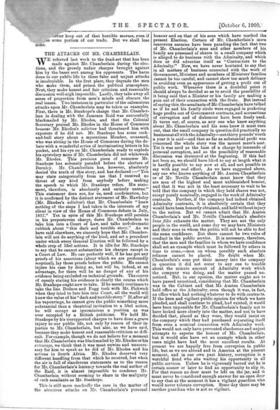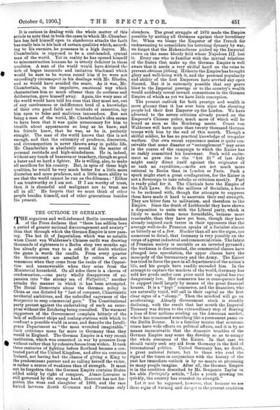THE ATTACKS ON MR. CHAMBERLAIN.
WE referred last week to the dead-set that has been made against Mr. Chamberlain during the elec- tions, and the grossly unfair charges brought against him by the baser sort among his opponents. The harm done to our public life by these false and unjust attacks is incalculable. In the first place, they degrade the men who make them, and poison the political atmosphere. Next, they make honest and fair criticism and reasonable discussion well-nigh impossible. Lastly, they take away all sense of proportion from men's minds and obscure the real issues. Two instances in particular of the calumnious attacks upon Mr. Chamberlain may be taken as examples. First, there is Mr. Stanhope's charge that Mr. Chamber- lain in dealing with the Jameson Raid was successfully blackmailed by Mr. Rhodes, and that the Colonial Secretary praised Mr. Rhodes in the House of Commons because Mr. Rhodes's solicitor had threatened him with exposure if he did not. Mr. Stanhope has some cock- and-bull story about a mysterious Member, unnamed, who was sitting in the House of Commons during the de- bate with a wonderful series of incriminating letters in his pocket, and his eye on Mr. Chamberlain ready to explode his epistolary mine if Mr. Chamberlain did not whitewash Mr. Rhodes. This precious piece of nonsense Mr. Stanhope has solemnly paraded before the electors of Burnley. Mr. Chamberlain has, however, absolutely denied the truth of this story, and has declared :—" You may state categorically from me that I received no threat of any kind from anybody before making the speech to which Mr. Stanhope refers. His state- ment, therefore, is absolutely and entirely untrue." This statement does not, for us, need confirmation, but it is confirmed by the distinct statement of Mr. Hawksley (Mr. Rhodes's solicitor) that Mr. Chamberlain "knew nothing of the steps I had taken in the interests of my client in view of the House of Commons debate in July, 1897." Yet in spite of this Mr. Stanhope still persists in his preposterous charge, dares Mr. Chamberlain to take him into a Court of Law, and talks melodramatic rubbish about "this dark and terrible story." As we have said elsewhere, we sincerely hope that Mr. Chamber- lain will not do anything of the kind, and, set a. precedent under which every General Election will be followed by a whole crop of libel actions. It is idle for Mr. Stanhope to say that he cannot substantiate his charges except in a Court of Law. He can perfectly well, if he has got any proofs of his assertions (about which we are profoundly sceptical), lay these proofs before the public. He cannot injure his case by doing so, but will be, indeed, at an advantage, for there will be no danger of any of his evidence being excluded on technical grounds. The course of openly stating his evidence is clearly the course which Mr. Stanhope ought now to take. If he merely continues to take the line Dodson and Fogg took with Mr. Pickwick when they tried to lure him into Court, all the world will know the value of his "dark and terrible story." If, after all his vapourings, he cannot give the public something more substantial than a theatrical invitation to a libel action, he will occupy as ignominious a position as was ever occupied by a British politician. We hold Mr. Stanhope by his unsupported charges to have done a grave injury to our public life, not only by reason of their in- justice to Mr. Chamberlain, but also, as we have said, because they make honest and reasonable criticism so diffi- cult. For example, though we do not believe for a moment that Mr. Chamberlain was blackmailed by Mr. Rhodes or his entourage, we think that it was most unwise and unneces- sary for him to speak as he did of Mr. Rhodes and his actions in South Africa. Mr. Rhodes deserved very different handling from that which he received, but when the air is full of slanderous statements as to the reason for Mr. Chamberlain's leniency towards the real author of the Raid, it is almost impossible to condemn Mr. Chamberlain without seeming to share in the malignity of such assailants as Mr. Stanhope.
This is still more markedly the case in the matter of the atrocious attacks on Mr. Chamberlain's personal honour and on that of his sons which have marked the present Election. Certain of Mr. Chamberlain's more rancorous enemies have been parading the fact that two of Mr. Chamberlain's sons and other members of his family are possessed of shares in a small company which is alleged to do business with the Admiralty, and which does or did advertise itself as "Contractors to the Admiralty." Now, we have never hesitated to say that in all matters of business connected with the work of Government, Ministers and members of Minister& families cannot be too careful, and cannot show too much delicacy in avoiding even an appearance of getting a profit out of public work. Whenever there is a doubtful point it should always be decided so as to avoid the possibility of it being said that a Minister or his family are making a gain out of their connection with the State. But instead of saying this, theassailants of Mr. Chamberlain have talked as if he and his family circle were engaged in pocketing huge profits out of Government contracts, and accusations of corruption and of dishonour have been freely used. It turns out, of course, as any one who knew anything about Mr. Chamberlain and his sons knew it must turn out, that the small company in question did practically no business at all with the Admiralty—not thirty pounds' worth a year it is said—and that as far as substantial profit was concerned the whole story was the merest mare's nest.
Yet it was used as the base of a charge by innuendo of personal corruption, and so the possibility of reasonable discussion was destroyed at the beginning. If this had not been so, we should have liked to say at length what it is hardly possible to say now at all, and not possible to say with any real effect. As we have suggested above, any one who knows anything of Mr. Austen Chamberlain or of Mr. Neville Chamberlain must know that they are men of the highest and most unblemished honour, and that it was not in the least necessary to wait to be told that the company in which they held shares was not, except purely nominally, engaged in the work of Admiralty contracts. Further, if the company had indeed obtained Admiralty contracts, it is absolutely certain that they would have been honestly obtained, and held without injury to the nation. But we cannot admit that Mr. Austen Chamberlain's and Mr. Neville Chamberlain's absolute bona fides exhausts the matter. They are not the only people in the world, and some day we may have Ministers and their sons in whom the public will not be able to feel the same confidence. But there cannot be two rules of conduct in the public service. It is necessary, therefore, that the men and the families in whom we have confidence shall set an example which must be followed by others in time to come,—men on whom possibly such absolute reliance cannot be placed. No doubt when Mr.
Chamberlain's sons put tbeir money into the company in question it did not occur to any one to trouble about the minute amount of Admiralty work which the company was doing, and the matter passed un- noticed. But, in our opinion, the matter ought not to have passed unnoticed, considering that Mr. Chamberlain was in the Cabinet and that Mr. Austen Chamberlain held office at the Admiralty, even though it was, in fact, an office which had nothing whatever to do with contracts. If the keen and vigilant public opinion for which we have pleaded, and shall continue to plead, had existed, it would have been impossible for Mr. Chamberlain's family not to have looked more closely into the matter, and not to have decided that, placed as they were, they would insist on the company which they had purchased separating itself from even a nominal connection with Admiralty work. This would not only have prevented slanderous and unjust attempts to asperse the honour of Mr. Chamberlain, but it would also have set an example which in other cases might have had the most excellent results. At present we are happily free from corruption in public life, but as we see abroad and in America at the present moment, and in our own past history, corruption is a watchful fiend who sits waiting his opportunity in all public services. Unless he is vigorously barred out he is certain sooner or later to find an opportunity to slip in. For that reason no door must be left on the jar, and it must never be considered enough answer for an open door to say that at the moment it has a vigilant guardian who would never tolerate corruption. Some day there may be another guardian who is not so vigilant. It is curious in dealing with the whole matter of this article to note that in both the cases insvhich Mr. Chamber- lain has laid himself open to slanderous attacks the fault has really lain in his lack of certain qualities which, accord- ing to his enemies, he possesses in a high degree. Mr. Chamberlain is supposed to be a cool-headed, cynical man of the world. Yet in reality he has opened himself to misconstruction because he is utterly deficient in these qualities. A man of the world would have divined the web of bogus innuendo and imitation blackmail which would be sure to be woven round him if he were not exceedingly circumspect in his dealings with Mr. Rhodes, and so would have avoided the snare. As it was, Mr. Chamberlain, in the impulsive, emotional way which characterises him so much oftener than do coolness and deliberation, gave himself away. Again, the wary man of the world would have told his sons that they must not, out of any carelessness or indifference bred of a knowledge of their own good faith and rectitude of intention, lay him open to false and malicious innuendoes. But not being a man of the world, Mr. Chamberlain's idea seems to have been that it was quite unnecessary for him to trouble about appearances so long as he knew, and his friends knew, that he was, as he is, perfectly straight. The man of the world knows that this is not enough, and that the extremity of prudence, discretion, and circumspection is never thrown away in public Mr. Chamberlain is absolutely sound in the matter of personal rectitude and high-mindedness. He is, indeed, without any touch of baseness or treachery, though so good a hater and so hard a fighter. He is willing, also, to make all sacrifices for his country. But, in spite of these high qualities, he would be very much better for a little more discretion and more prudence, and a little more ability to see that the world cannot be run on the dilemma: 'Either I am trustworthy or I am not. If I am worthy of trust, then it is shameful and malignant not to trust me all in all.' He forgets that we must think of other people besides himself, and of other generations besides the present.



















































 Previous page
Previous page